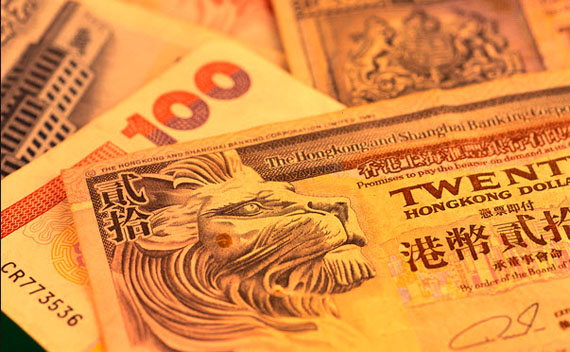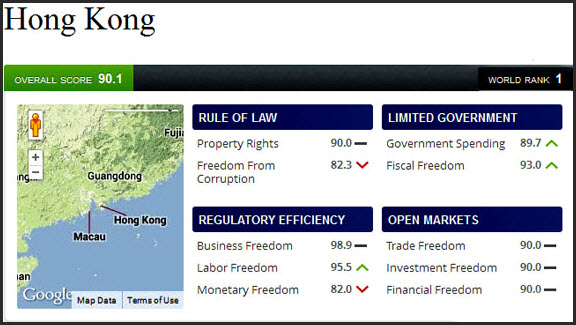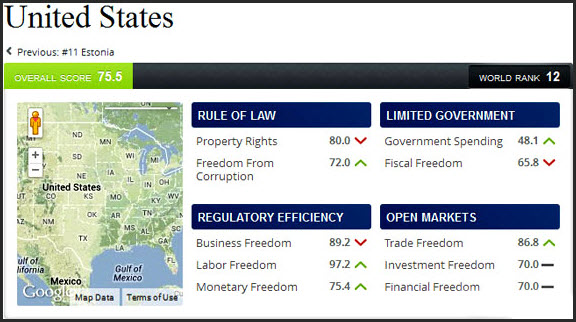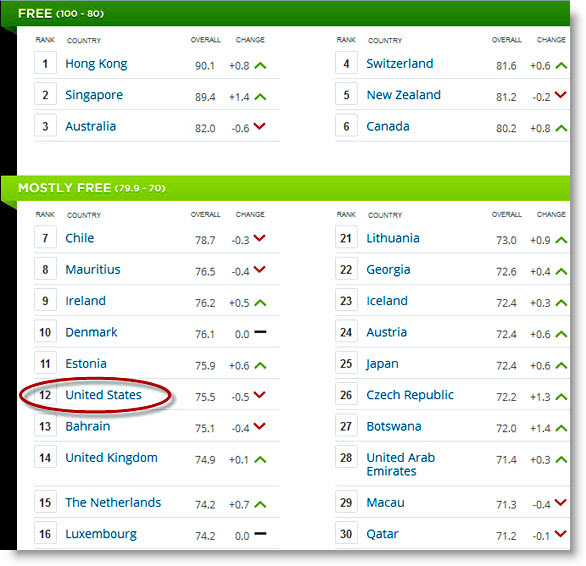
[HOME ] [ABOUT] [PHOTOS] [VIDEO] [BLOG] [HOUSTON] [TEXAS] [U.S. NEWS] [WORLD NEWS] [SPORTS] [POP CULTURE] [CONTACT]
Hong Kong retains its title as world's most free economy

by Joseph Earnest January 14, 2014
Newscast Media HONG KONG—A study that has just been released shows that Hong Kong has once again been ranked the world's most free economy, with an economy freedom score of 90.1 for the 20th consecutive year. Hong Kong is ranked 1st out of 42 countries in the Asia–Pacific region and 1st in the world according to the study done by Heritage Foundation in conjunction with the Wall Street Journal.
RULE OF LAW
Hong Kong enjoys low rates of corruption, although business interests exercise a strong influence in the unicameral legislature (one chamber) and executive branch. The judiciary is efficient and independent, and the rule of law is respected. Property rights are well protected, and the government devotes significant attention and resources to enforcement of intellectual property laws.

Government spending remains equivalent to slightly under one-fifth of the domestic economy. Public debt is virtually nonexistent, and a budget surplus has been maintained even in light of increased government spending and tax rebates.
Meanwhile, the United States, with an economic freedom score of 75.5, is the 12th freest economy in the 2014 Index. Its score is half a point lower than last year, primarily due to deteriorations in property rights, fiscal freedom, and business freedom.
President Barack Obama won re-election in 2012, and the continuing underperformance of the U.S. economy, by far the world’s largest, is a serious concern. The Administration’s uncertain responses to foreign policy challenges in Libya, Egypt, Syria, and Iran, among others, have reduced U.S. influence in countering tensions in the Middle East. Implementation of the health care law passed in 2010 has hit major snags and appears to be significantly hurting job creation and full-time employment.

Partisan disagreements over spending levels led to a partial shutdown of the federal government in late 2013. The expansive use of government regulatory agencies to manage economic activity, particularly in the financial, health care, and energy sectors, has opened the door to increased perceptions of cronyism and corruption. Although property rights are guaranteed and the judiciary functions independently and predictably, protection of property rights has been uneven, raising charges of favoritism.
The top individual income tax rate has risen to 39.6 percent, and the top corporate tax rate remains at 35 percent. Other taxes include a capital gains tax and excise taxes. The payroll tax holiday expired at the beginning of 2013. The overall tax burden amounts to 25.1 percent of gross domestic income. General government expenditures are slightly over 40 percent of GDP. Total public debt equals over 100 percent of the size of the economy, while Hong Kong enjoys a "zero" public debt.
TOP 30 LIST

|
|
Join the Newscast Media social networks
for current events and multimedia content.
Copyright© Newscast Media. All Rights Reserved. Terms and Privacy Policy
